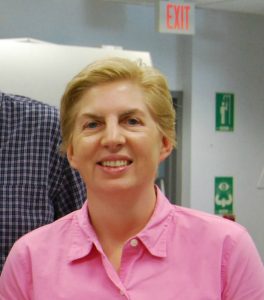
During spring break, as students were evacuating the New College campus due to the coronavirus (COVID-19) pandemic, Katherine Walstrom, Ph.D. was brainstorming.
With her Biochemistry II class less than two months away from completion, the associate professor of biochemistry was preparing her students to pick a topic upon which they could write their year-end grant proposals.
Walstrom sent them all a survey, asking if they would be interested in basing their research on COVI
D-19. And, when she received their responses on March 24, she was both surprised and proud: all five students wholeheartedly said yes.
“I wanted to give them the option. I also didn’t want to overwhelm them with an ‘all coronavirus, all the time’ kind of thing, so it was really up to them to decide,” Walstrom said. “But, all the students who responded to my survey said they wanted to write proposals about the coronavirus.”
Now begins a collective effort, which will continue until the final grant proposals are due on May 12, for Walstrom’s class to focus all research on the world’s most pressing scientific subject.
There will be virtual in-class discussions as students gain experience reading relevant journal articles and devising new experiments to do in the field (which will build on previous research). They will then propose new experiments and test hypotheses.
Walstrom has been inspiring students to engage in this type of topical, outside-the-box thinking for the past 21 years as a professor at New College. Her biochemistry-based perspective on pandemics has been cultivated through years of experiential learning and teaching, and she has established herself as a lauded scientific voice.
Earlier this month, in a local interview with the Suncoast News Network (SNN), she broke down the coronavirus particle (discussing how it has a protein-protein interaction in the lungs, attaching itself to the protein, killing the cell and spreading more viruses). The virus, she explained, can cause the immune system to go into overtime, killing other important cells in the body as it tries to fight the coronavirus. It can be asymptomatic and spread remarkably quickly.
“People have been talking about this kind of thing happening for years. With SARS, there were all these mechanisms in place to sort of stop the spread. That virus had different characteristics, which made it easier to track. With this one, you’re infectious before you get symptoms, so that makes it much easier to spread,” Walstrom said. “I thought, at first, maybe they could contain it, but when people started popping up in other places, I knew it was going to be bad.”
Walstrom is concerned that the labs and hospitals are running out of masks and gloves, and that the testing supplies are not being manufactured rapidly enough.
“It’s definitely going to be a wakeup call. Hopefully, we can get some better procedures in place to deal with something like this better in the future,” Walstrom said. “It’s going to take a long time to figure out a treatment or vaccine, so people who don’t catch it now won’t have any immunity to it in the future. Over time, more and more people will be immune, and fewer people will be actively infected. Also, viruses change over time, so the characteristics might change.”
Walstrom has been deeply tuned into the changing news of the coronavirus for months, and that foresight helped her effectively prepare her students for the emptying of the campus. At the beginning of the month, before the evacuation order, she began implementing her regular hurricane preparation in the laboratories of the Heiser Natural Science Complex.
“The natural sciences division has an emergency preparedness plan that includes backing up computers, etc. In some ways, we’re in better shape here in Florida because we have to be ready for hurricanes,” Walstrom said. “I went through the whole lab and unplugged all the instruments. Some people took their animals home. We’re keeping the office locked so no students can go in, and you have to bring your own key.”
When Walstrom’s students are physically in the labs during non-pandemic times, they are working with DNA, RNA or proteins (comparing what happens with a worm protein, for example, with what happens with a human protein). She also hosts virology tutorials. Many of her students have pursued careers in medicine.
“One of our graduates is up at Moffit in Tampa, trying to get coronavirus testing going,” she said. “A whole bunch of New College students are working as medical scribes, so they’re on the front lines, working in the hospitals right now.”
Walstrom is also part of a larger New College faculty conversation that centers on potentially launching a class in the fall of 2020 (either a first-year seminar or a team-taught course) about the virus and its widespread effects.
For accurate information on the coronavirus, visit Walstrom’s suggested site: the-scientist.com.
Abby Weingarten is the editor/writer in the Office of Communications & Marketing.